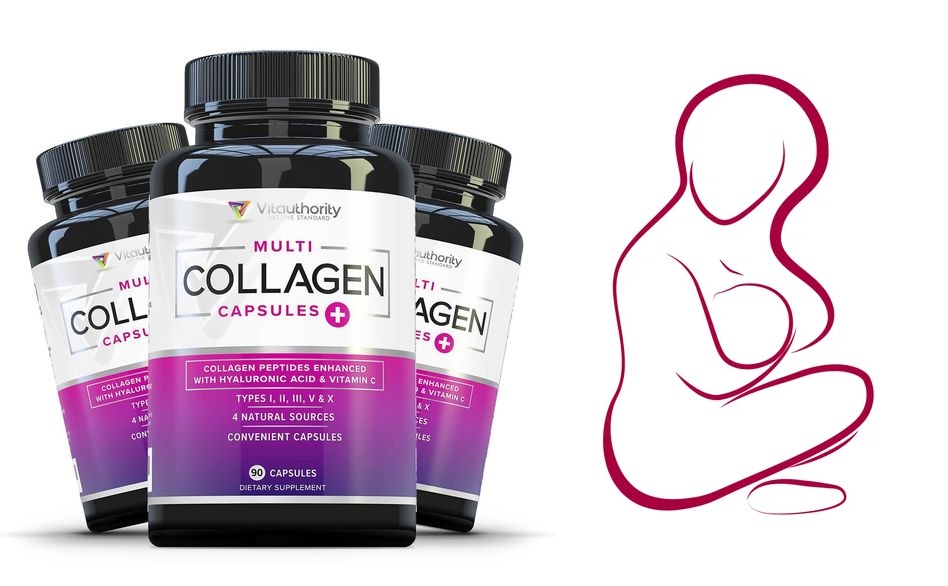After childbirth, women look for ways to get back to things they gave up during pregnancy. But you cannot get back to everything while breastfeeding. Taking supplements like collagen is something you should think twice about. Can you take collagen while breastfeeding?
Before we answer that question, we have to remind you of something. The process of breastfeeding can be influenced by many factors, namely hormones. We know hormones fluctuate with bodily changes and the milk you produce is affected by what you consume. With that in mind, let’s talk more about collagen supplements.
Reader's Roadmap
What is Collagen?
Simply put, collagen is a protein. It makes up 30% of our total protein mass. Collagen is the fibrous structural connective tissue we find in ligaments, tendons, cartilage, our skin, and blood vessels. Here is a fun fact for you. There are 28 different types of collagen.
But what you probably do not know is that from age of 18, the amount of collagen present in our body declines. And it does so at a rate of 1% decline each year. This steady decline can contribute to thinner and more dehydrated skin, wrinkles, and other visible signs of aging.
This is why people opt for collagen supplementation so that they can reduce the effects of that collagen decline.

What Are Collagen Supplements?
We said collagen is a vital protein found in abundance in our bodies. Our body stores quite a lot of collagen, but that amount decreases over the years. Collagen protein makes our skin more elastic, resistant to sagging, and our bones healthier.
Collagen powder supplements are marketed as ways to add more collagen into our body and improve our overall health. There are studies that show oral collagen supplements have a beneficial impact.
How do these supplements work? Well, unlike other ingested vital protein sources, orally ingested hydrolyzed collagen is absorbed into the bloodstream from the small intestine. There, it has been distributed throughout the human body, namely to our skin. When collagen gets to the skin, it contributes to the building of connective tissue.
There are still studies that need to be done on the positive effect of oral collagen on our skin. But the promise is there.
How Much Collagen Should You Take Per Day?
According to most studies, adults should consume between 2.5g and 9g per day. This is a dosage considered safe and tolerable to consume.
You can get that amount of collagen levels by mixing it into smoothies, baked goods, or even tea.
Why Do Women Drink Collagen Protein?
Name a woman who doesn’t want to look good. Or a woman who doesn’t want to get rid of wrinkles and sagging skin?
We have to remember that when a woman is pregnant or nursing, her body goes through massive changes. Due to hormonal imbalances and fluctuating body size, a woman’s body can present challenges. A collagen intake boost can ease many of the issues and challenges.
Women choose to drink collagen because it brings many benefits, namely for their skin elasticity. Here are three reasons why women drink collagen.

Beautiful Skin
The effects of collagen on skin health are proven. Collagen can help limit wrinkles, prevent acne, and make your skin brighter and smoother.
And women notice the effect of collagen on the skin fairly quickly.
Improved Bone Health
We have to get into the nitty-gritty here. Breast milk contains high levels of calcium, a mineral that is of vital importance for bone health and teeth health. It is also important for the bones and teeth of a growing infant.
Because of that, women need to increase their calcium consumption. Because of the increased demand for calcium, a nursing mother’s body may resort to bone resorption. During that process, calcium stored in the bones of the breastfeeding mom is drawn out and redirected to breast milk.
This is an entirely natural and normal process. But it can lead to problems down the road like osteoporosis later in life. Collagen can help with that.
Stronger Hair And Nails
Any woman knows that hormone levels rise and fall during pregnancy and lactation. And these changes can result in hair loss following childbirth. Nails can become brittle and weak.
Because collagen is a building block, a diet rich in supplemental collagen can improve the strength of hair and nails.
Are There Any Side Effects?
In this case, the benefits outweigh the potential risk. Yes, there are chances of side effects, but they are mostly rare. Yet, we have to note them. You should always speak with a licensed doctor before taking supplements, especially if you are pregnant or lactating. Here are some possible side effects:
- Loss of appetite, making it more difficult for nursing women to get the extra calories they need
- Immune response, usually displayed as rash because of the increased sensitivity
- Allergic reaction because some collagen supplements are made of eggs, nuts, milk, or seafood

Can You Take Collagen While Breastfeeding?
This is a tricky question. There is no simple answer. If you took supplements before or during pregnancy, it is best that you stop and evaluate with a doctor for the potential effects on milk production. Collagen supplementation is generally thought to be safe for a breastfeeding mom.
Postpartum women who struggle with hair loss and stretch marks take collagen to improve their condition.
You should also consider that supplement safety is not regulated by the FBA. Manufacturers do not need to prove safety or efficacy.
If you feel collagen will help you, talk to a doctor. But the most important thing is to eat a healthy and balanced diet.
Safety Precautions
If you decide to take supplements, after all, it is important that you research the topic. Collagen supplements are not all the same. You need to figure out exactly what you are taking.
- Examine the ingredients, all supplements are sourced and created differently. This way, you can understand what is exactly in your collagen supplement
- Understand how the supplement works, not every collagen supplement is absorbed into your body the same way. For example, hydrolyzed collagen or collagen peptides are more easily absorbed by your digestive system
- Think about what you are already taking as supplements. Consider the interaction between your different supplements
At What Point Should You Take Collagen Supplements?
Most experts agree that 6 months after giving birth is the right time for a nursing mother to start using collagen powder supplements.
Before using it, consult a doctor. It is better for nursing mothers to source collagen from collagen-rich foods like salmon, soybeans, eggs, and others. You can also source vitamin C from fruits and vegetables. This will help your body naturally produce more collagen.
Start with a smaller dose, and then gradually increase the dose as directed by your doctor. Oral collagen should be taken at 10 pm, not before.
Final Verdict
The majority of collagen supplements are extracted from the skin of animals. And once collagen enters the body, it is converted into amino acids, which is similar to protein supplements.
With that in mind, breastfeeding mothers taking collagen can be safe. It does not affect breast milk for babies. Yet, before deciding to take these oral supplements, you should consult a doctor. This will help you avoid any side effects and allergic reactions. Your physician will also come up with a suitable and safe dose during lactation.







Leave a Reply
View Comments